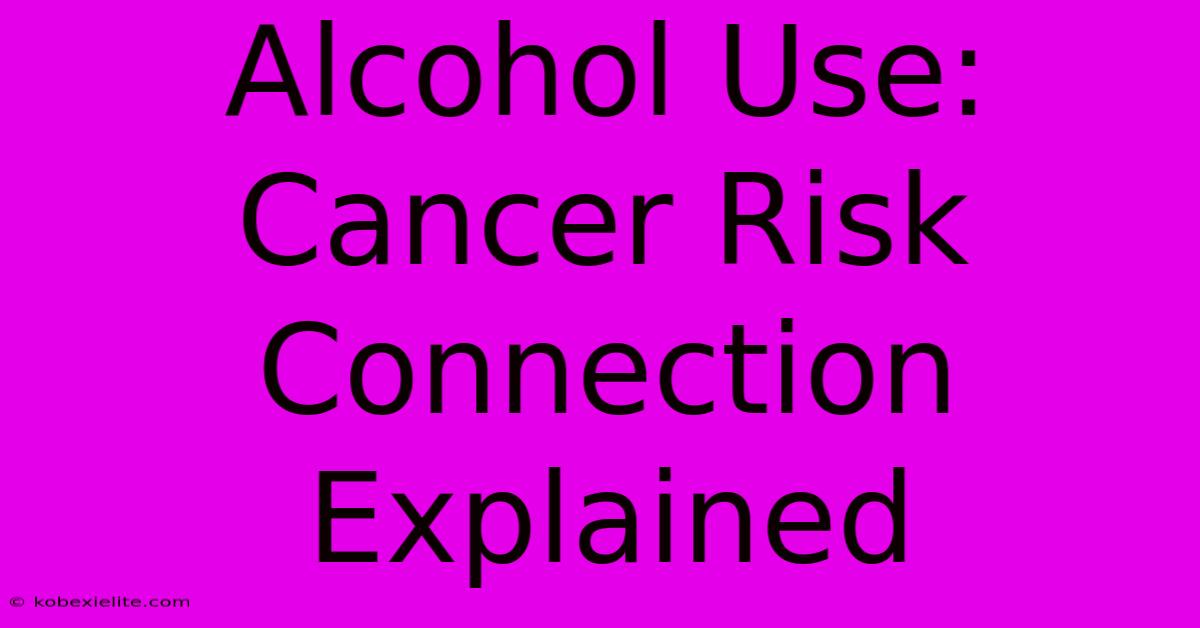Alcohol Use: Cancer Risk Connection Explained

Discover more detailed and exciting information on our website. Click the link below to start your adventure: Visit Best Website mr.cleine.com. Don't miss out!
Table of Contents
Alcohol Use: Cancer Risk Connection Explained
Alcohol consumption and cancer risk are strongly linked. While moderate drinking might seem harmless, even small amounts of alcohol increase the chance of developing certain cancers. Understanding this connection is crucial for making informed decisions about your health.
The Link Between Alcohol and Cancer: How Does it Work?
The exact mechanisms by which alcohol causes cancer are complex and still being researched. However, several key factors contribute to this dangerous association:
1. Acetaldehyde: A Cancerous Byproduct
When your body processes alcohol, it produces a toxic chemical called acetaldehyde. This substance is a known carcinogen, meaning it directly damages DNA and can lead to the development of cancerous cells. Your liver is primarily responsible for metabolizing alcohol, making it particularly vulnerable to acetaldehyde-induced damage and increasing the risk of liver cancer.
2. Nutritional Deficiencies
Heavy alcohol consumption often disrupts nutrient absorption and can lead to deficiencies in essential vitamins and minerals. These deficiencies weaken the immune system, making it less effective at fighting off cancerous cells. This weakens the body's natural defenses against cancer development.
3. Hormonal Imbalances
Alcohol can disrupt hormone levels, particularly estrogen in women. Elevated estrogen levels are linked to an increased risk of several hormone-sensitive cancers, including breast cancer.
4. Chronic Inflammation
Regular alcohol use promotes chronic inflammation throughout the body. Inflammation is a known driver of many diseases, including cancer. This persistent inflammation creates an environment conducive to the growth and spread of cancerous cells.
Types of Cancer Linked to Alcohol Consumption
Alcohol use is linked to a significant increase in the risk of several types of cancer, including:
- Breast Cancer: Even moderate drinking raises the risk of breast cancer in women.
- Liver Cancer: Heavy alcohol use is a major risk factor for liver cancer, often leading to cirrhosis (scarring) of the liver.
- Colorectal Cancer: Alcohol consumption is associated with an increased risk of colorectal (bowel) cancer.
- Mouth, Throat, and Esophageal Cancers: The chronic irritation caused by alcohol, often combined with tobacco use, significantly raises the risk of cancers in these areas.
- Pancreatic Cancer: Alcohol consumption is associated with an increased risk of developing pancreatic cancer.
Reducing Your Risk: Steps You Can Take
While completely eliminating alcohol is the safest approach, reducing consumption significantly lowers your cancer risk. Here are some steps you can take:
- Limit Your Intake: Adhere to recommended guidelines for alcohol consumption, or even consider cutting back further. Remember that even "moderate" drinking carries some level of risk.
- Choose Low-Risk Beverages: If you do choose to drink, opt for lower-alcohol content beverages.
- Maintain a Healthy Diet: A balanced diet rich in fruits, vegetables, and whole grains can help mitigate some of the negative effects of alcohol.
- Regular Exercise: Regular physical activity contributes to overall health and strengthens the immune system.
- Don't Smoke: Combining alcohol and tobacco use dramatically increases the risk of several cancers.
Conclusion: Informed Choices for a Healthier Future
The link between alcohol use and cancer is undeniable. By understanding the risks and making informed choices about your alcohol consumption, you can significantly reduce your chances of developing these life-threatening diseases. If you have concerns about your alcohol consumption and its potential impact on your health, consult with your doctor or healthcare provider. They can provide personalized advice and support to help you make healthy choices. Remember, even small changes can make a big difference in protecting your long-term health.

Thank you for visiting our website wich cover about Alcohol Use: Cancer Risk Connection Explained. We hope the information provided has been useful to you. Feel free to contact us if you have any questions or need further assistance. See you next time and dont miss to bookmark.
Featured Posts
-
150 Cdc Vouchers Now Available
Jan 04, 2025
-
When And Where To See The Quadrantids In Uk
Jan 04, 2025
-
Chaotic Vote Johnson Wins Speakership
Jan 04, 2025
-
New Orleans Attack What Experts Say
Jan 04, 2025
-
Minnesota Vs Virginia Tech Tv Channel And Dukes
Jan 04, 2025
